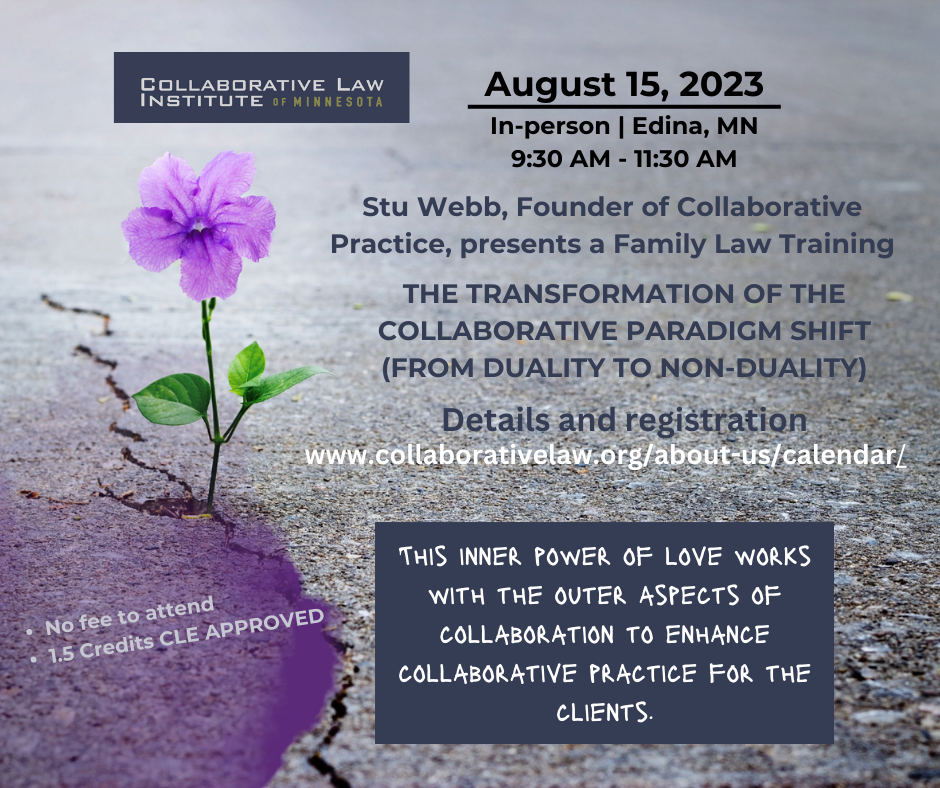Every December our Collaborative community has a wonderful opportunity to gather for our Annual Forum.
The Forum is a time and place to connect with colleagues, become informed and educated about important professional topics, regenerate our passion and enthusiasm for our Collaborative work, and have fun!
You won’t want to miss this opportunity. We so look forward to seeing you and hope you will join us!
Event Details:
What: CLI Minnesota Forum 2023
Theme: Creativity in Collaborative Practice
Dates & Times:
Thursday, December 7, 2023
8:30 AM – 4:15 PM Educational sessions, time with exhibitors
3:15 PM Special Breakout session for students and non-member professionals to learn more about Collaborative Practice.
4:15 PM Happy Hour
6:00 PM Dinner
7:30 PM AJW Fun Factor
Friday, December 8, 2023
8:30 AM – 12:00 PM Annual Meeting, educational sessions
Full Agenda: Click here
Location: InterContinental Saint Paul Riverfront Hotel |11Kellogg Blvd. East, Saint Paul, MN 55101
Menu:
BREAKFAST BOTH DAYS: Continental
LUNCH THURSDAY: Sandwich Shop Buffet:
DESSERT BUFFET: Cookies and bars
HAPPY HOUR APPETIZERS and CASH BAR
DINNER: Baby Beet and Arugula Salad with Candied Walnuts: Creamy Goat Cheese, Citrus, Orange-Vanilla Vinaigrette.
Choice of:
Sautéed Salmon | Paella Rice, Meyer Lemon Sabayon
Seared Chicken | Natural Pan Sauce, Smoked Gouda Mashed Potato
Butternut Squash Ravioli | Mascarpone Sage Cream Sauce, Sauteed Spinach, Balsamic Reduction
Dessert: Lemon Tart
Cost:
CLI members must login to their online account to receive member pricing.
ALL PACKAGES WITH HOTEL ROOMS ARE SOLD OUT.
PLEASE REGISTER WITOUT HOTEL AND CONTACT THE HOTEL DIRECTLY FOR AVAILABILITY OF A ROOM.
Both Days, with overnight, with dinner: SOLD OUT
Both days, no overnight, with dinner:
Includes both Thursday & Friday
Includes Thursday Lunch & Dinner
Includes Thursday Evening Entertainment
Member: $375
Non-member: $450
Both days, no overnight, no dinner:
Includes both Thursday & Friday
Includes Thursday Lunch
Includes Thursday Evening Entertainment
Member: $350
Non-member: $425
Thursday only, with overnight, with dinner: SOLD OUT
Thursday only, no overnight, with dinner:
Includes Thursday
Includes Thursday Lunch & Dinner
Includes Thursday Evening Entertainment
Member: $225
Non-member: $300
Thursday only, no overnight, no dinner:
Includes Thursday
Includes Thursday lunch
Member: $175
Non-member: $250
Thursday dinner only
Member: $50
Non-member: $75
Friday Only:
Includes Friday
Member: $100
Non-member: $175
Continuing Education: (See agenda for specific credits)
CLE: Standard (X) credits pending
LMFT & MN Board of Psychology: Standard credits (X) pending
LICSW & ADR: A self-filing certificate will be provided (X possible)
Special Breakout Session for Students and Family Law Professionals
Thursday 3:15 PM | CLICK HERE TO RSVP FOR THIS SESSION ONLY
A special opportunity for Students and non-member professionals interested in learning about Collaborative Practice.
Registrants for this special session are invited to stay for the networking happy hour following the informational session, and for the add-on cost of $30, stay for dinner.
Cost for Students and non-CLI member professionals to attend the
3:15 PM Breakout Session:
Attend the 3:15 Breakout Session & happy hour: $0
Dinner add-on: $30
Deadlines, Cancellations, Parking:
-Deadline for registration with a hotel room is November 24.
-We can only guarantee an overnight room at the Hotel for the first 35 registrants, so please register EARLY!
-The deadline for Forum registration without a hotel is November 28.
-Refunds for Forum registration cancellation will be processed if notice of cancellation is received on or before November 17.
-While the room rate is included in the Forum attendance fee, attendees will be responsible for incidental charges to their reserved room.
-Hotel check-in is 3PM. Luggage may be checked with the valet.
-Check-out time is 11AM.
-Parking: Parking is available through the valet service at prevailing rates or nearby surface lots.
Agenda: Click here
Sponsorship Packages available Click here
Sponsors Supporting the CLI Mission and Forum 2023
Annual Platinum Partner
Rainbow Mortgage, Inc. www.rainbowmortgageinc.com | Dave Jamison
Annual Gold Partners
OurFamilyWizard www.ourfamilywizard.com | Racheal Howitz
Keller Williams Integrity Realty www.pickle.properties | Lisa Proechel
The Prudden Company www.pruddencompany.com | Amber Tyrrell
Annual Silver Sponsors
Baker Vicchiollo Law LLC www.mnlaw.us | Jolene Baker Vicchiollo
CrossCountry Mortgage, LLC www.crosscountrymortgage.com/brett-leschinsky Brett Leschinsky
Edina Realty www.edinarealty.com/jennifer-morris-realtor# | Jennifer Morris
Sponsors Supporting the Forum 2023
Forum Breakfast Sponsor
The Katallasso Group www.thekatallassogroup.com | Lisa Welter
Forum Lunch Sponsor
Cultivating Joy www.cultivatingjoycoach.com | Jillian Lydell
Forum Dessert Sponsor
Family Law Software www.familylawsoftware.com| Nancy Shafer
Forum Charging Station
Alerus Mortgage www.RandiLivon.com | Randi Livon
Forum Materials Packet
Lear Appraisals, LLC learappraisals@popp.net | Bob Lear
Forum Happy Hour Sponsor
Thomson Reuters www.ThomsonReuters.com | Ryan Tauer & Steve Stauff
Forum Evening Social Sponsor
AJW Financial, Inc. www.ajwfinancial.com | Amy Wolff







 While researching for this post, I came across a number of divorce-related blogs. The blog medium provides an efficient and concise opportunity to share information and educate the public. This blog focuses on the
While researching for this post, I came across a number of divorce-related blogs. The blog medium provides an efficient and concise opportunity to share information and educate the public. This blog focuses on the 

